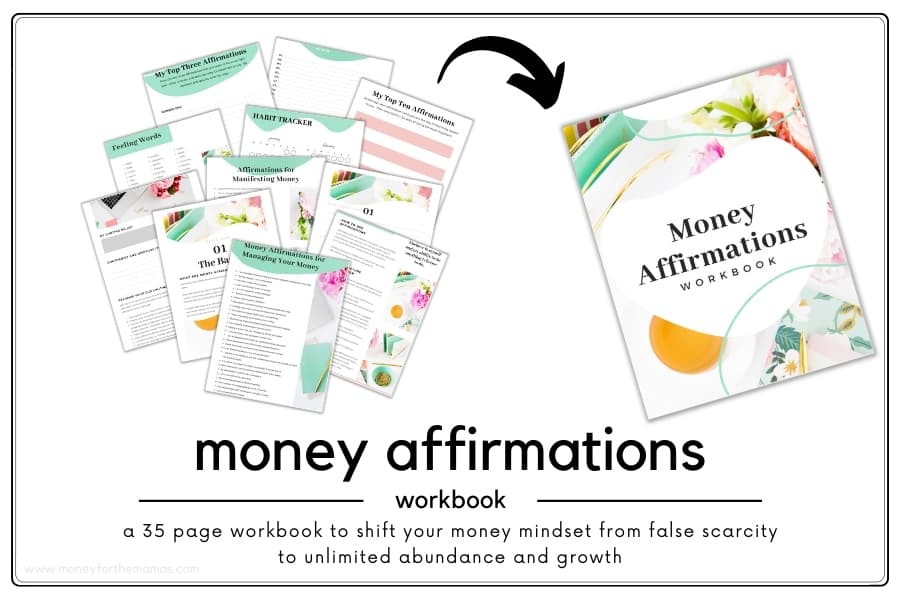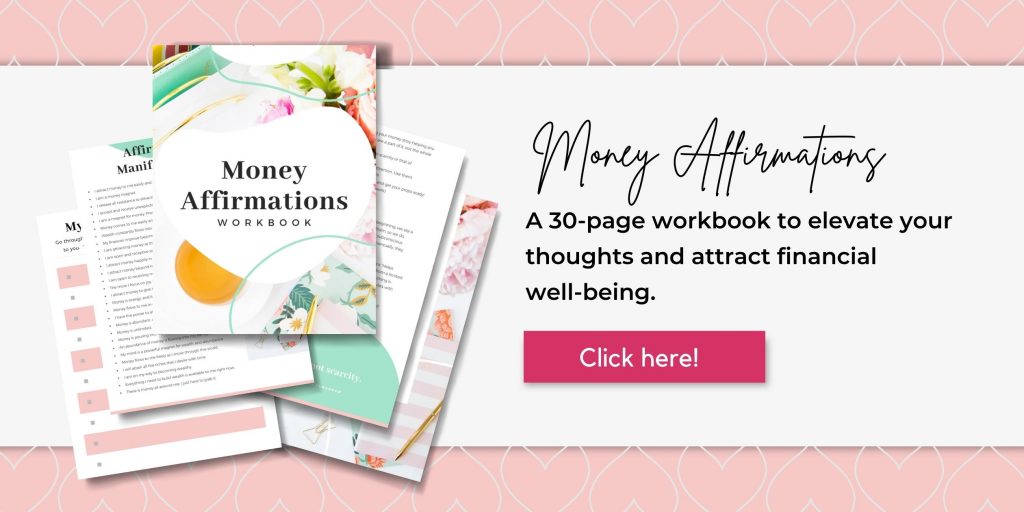Conquer Your Money Demons by Dumping Your Limiting Beliefs About Money
Here’s the simple 6-step process for rewriting your money blocks and finally winning with money!

Author: Kari Lorz – Certified Financial Education Instructor
What do you believe about your strengths, your weaknesses, your abilities, and your potential? That’s a lot to unpack, especially when you layer money into the picture.
Money adds a whole other barrel of monkeys, and sometimes these monkeys are wreaking havoc on your mindset. They are sabotaging you, making things harder or near impossible for you to reach financial success!
Let’s call the monkeys what they really are, limiting beliefs about money that are hurting you, bringing you down, time and time again!
We’ll work through some of the most common limiting beliefs about money. And if you do the work, you will step on over to the side of financial abundance!

This post may contain affiliate links. If you make a purchase, I may make a commission at no cost to you. Please read my full disclosure for more info
What are limiting beliefs about money?
A self limiting belief is a state of mind, a conviction, or belief that you think to be true that limits you in some way. A limiting belief about money just specifies that your view is about you & money. These can also be called money blocks.
An example of a limiting belief about money is “I’m bad with credit cards.”
According to LifeHack, “Limiting beliefs can have a number of negative effects on you. They could keep you from making good choices, taking new opportunities, or reaching your potential. Ultimately, limiting beliefs can keep you stuck in a negative state of mind and hinder you from living the life you truly desire.”
Another example, on a more subconscious level, is that you can’t ever seem to hold on to cash. You spend it as soon as it gets in your pocket. Although you know saving is important, and you want to save, it just doesn’t seem that you actually save any money.
Examples of financial limiting beliefs
- I’m not smart enough to invest.
- I won’t ever make enough of an income to be able to save.
- I’ll never get out of the paycheck to paycheck cycle.
- I’m bad with money.
- There’s never enough money for everything.
- You have to work hard for money.
- Money can’t buy happiness.
- I should only spend money on my family, not on myself.
- I don’t deserve to have more money.
- Only money will make me important.
- As soon as I get it, it’s gone again.
- Only bad people want more money.
- People only hang out with me for my money.
- Everyone thinks I’m an idiot because of my debt.
How to overcome your limiting beliefs and clear your money blocks
There is a process to this, but as with any new “thing” you do, it may feel clunky at first, awkward or silly. Keep at it; the more you do it, the easier and more free-flowing it will become. And yes, it’s absolutely worth the effort and dedication to get good at this process.
Just because you clear one money block, it’s not all smooth sailing. As you grow and develop, so will the needs of your financial life. It’s like getting a promotion at work. You got rid of your old hassles, but new issues are likely on the horizon. That’s why embracing this process is essential; you will use it your whole life across many areas.
Step One – recognize your money block for what it is.
Call a spade a spade! That’s easier said than done, so use some silly interrupters to snap yourself out of the spiral. I detailed this process out in understanding your money story.
The point is, that you need to recognize that you are sabotaging yourself, which isn’t easy. Recognize the line by asking yourself, “Is this ________ (your negative belief) always 100% true?” The answer should be no because nothing is 100% true all the time, without fail.
Step Two – find contradicting evidence
Think about when your self-limiting belief wasn’t true. Go over a few examples when the opposite was true. Pull those examples up and visualize them, get clear on how the opposite was true. Remember, negativity bias is in play here, so it may take a bit to think of something positive; that’s normal.
Step Three – forgive yourself
Stop being so hard on yourself! (did you say that in your best mom voice?) Let the anger towards yourself go, as you can’t reach out for a new truth when you are grasping on so hard to the lie. Relax, let go, and forgive and thank yourself for choosing a better path. Writing these emotions out in a money journal can be so helpful for a heavy heart. It’s like releasing that burden once you get it all out.
Many times people feel they also need forgiveness through prayer. Praying to the Lord about your money worries can be very freeing and take the weight off your shoulders.
Step Four – Reframe your money belief
Take your limiting belief and reframe it to be the opposite as if it were already true! You need to convince yourself (your logical brain and your subconscious) of this new truth. If you need some inspiration, be sure to check out 250+ money affirmations to a positive money mindset! Creating a new belief is very empowering! Don’t limit yourself to just one, write down a couple if you want to.
Magnify the positive!
If you’re looking for help then grab the Money Affirmations Workbook, where you have all the affirmations here listed out (it makes for easy highlighting)! And it walks you through creating your own personal affirmations.
Step Five – get clear
Once you are in a calmer mindset, it’s time to plan! Why? Because it puts you in the driver’s seat of your life. Detail out what action steps will help you bring your affirmation closer to the truth.
For example, if you’re goal is to learn more about how to better manage your money, your action steps may look like this…
- Understand what my current money personality is, and is this helping me or hurting my progress?
- Spend one hour googling who the experts are in this field
- Join some Facebook groups where getting better with money is the focus
- Do the money gurus have podcasts? Download them!
- Block out 1 hour a day to learn (either on the commute, at home, etc.)
Another example of your money belief is, “I’m a bad person because I want more money, only greedy people want more money.” Go and…
- Read up on all the great charitable work that the Bill & Melissa Gates Foundation does.
- Look up some nonprofits in your area and see if any of the organizations resonate with you. If so, donate $20 immediately, and sit with how it feels to use your money to help others.
- Spend money wisely by using the EcoCart Chrome extension. When you buy anything online through their extension they will help offset the carbon footprint of your order by donating the commission from the order to NPO’s that help save the earth. Using your money for good can be a great boost to cement your new affirmation!
Taking action may also mean that you need to edit out a few things in your life. This could mean friends that try and derail you (i.e., let’s go shopping!) or family members that don’t support your growth or make you feel bad about yourself. This is a hard step, but usually, a necessary one that will help you rise above your past and catapult your growth!
Step Six – be proud
Getting honest and uncomfortable with yourself is HARD AF! Take a few minutes and be proud of your openness and desire to grow. Be proud of each and every small step you take towards the new you!
Yes, you may stumble, you may backtrack, and that’s okay. What’s important is that you don’t give up!
Now that we’ve walked through what limiting beliefs about money are, why it’s essential to handle them, and how to overcome these money blocks, let’s check out four common negative thoughts and the new script for each.
How do I know if I have a money block?
I hate to be the bearer of bad news, but almost everyone holds limiting beliefs about money deep in their brain (consciously or unconsciously). Either apparent to you or more subdued but still there, just under the skin, nagging at you.
A few questions to ask yourself…
- Do I avoid money (talking about it, thinking about it, managing it)?
- Does thinking about money and managing my money make me feel anxious, angry, sad, yucky, resentful, pissed off, dread, etc.?
- Do you ever regret purchases you make or resent spending money on certain things?
Where do limiting beliefs about money come from?
There are lots of intertwined layers and threads when it comes to our attitudes about having wealth. Understanding how you feel about money usually begins with your money story, how you learned about money as a child. Even if you didn’t realize you were learning about money when you were six years old, you absolutely were!
Also, your overarching money mindset is influenced by your money blocks, and your money script plays a part in the overall narrative of your money blocks as well.
Plus, we’ve probably made some financial mistakes in our past, which is totally normal! No one is born knowing how to handle money, it’s a learned skill, and we learn best by making mistakes! YET, it’s common for money mistakes to have a significant impact on us and our life. So we hold onto these memories very tightly. This is called negativity bias.
According to Healthline, “We humans have a tendency to give more importance to negative experiences than to positive or neutral experiences. This is called the negativity bias,” a perfect environment for a money block. Research has proven that we are hardwired for this bias as part of our survival senses. I’ll let Marie break it down for you!
Are you confused yet? Don’t worry; you don’t have to understand it from top to bottom to see & shift what is holding you back. For now, just know that there are reasons for the way that you feel about and handle money, and they are a part of something bigger.
But the good news is that you can absolutely work on your scarcity mindset and belief system (i.e., unconscious belief) around money and shift it to work for you in a different way instead of against you.
I know that sounds like a lot of hard work and vague, hard work at that. So why do you even want to delve into something that you dread?
I’m glad you asked!
Why is it important to clear your money blocks?
Money is essential to 90% of humans in today’s society (that’s a fake stat but you get the idea). It’s important because we use money to buy the things we need to live. We use it (or benefit from it) daily.
Our relationship with money is very special, as it’s one of the few relationships that we have for our entire lives. The other is our relationship with food and with ourselves.
Other people, things, and beliefs may come and go, but money is a constant. (Unless you live in the woods and use the barter system for the things you need). Yet, the level of importance shifts from person to person and the stage in your life.
If you have a scarcity mindset towards money, it is probably holding you back from achieving your dreams & financial success. Most of us want more money or to be better stewards of the money we have. Hardly anyone says, “I’m 100% happy with my financial situation.” Almost everyone has some aspect of their finances that they aren’t happy with.
Money blocks are, in a way, self-sabotage, and unless you recognize that and then take steps to change it, you could be sabotaging yourself for the rest of your life. Yikes!
Recognizing and clearing your money blocks can help you get to where you want to be! Let’s dig into the process of how to overcome limiting beliefs so you can start achieving your financial goals!

4 common limiting beliefs about money – and how to flip them!
We talked about how people have money scripts in this post on understanding your money story, so I’ll be brief here. People’s thoughts about money typically fall into four core belief buckets, or “scripts,” as they call it. I’ll list them and give a very generalized brief description…
- money avoidance – suggest a belief that money is bad
- money vigilance – like to do what is “right” with money
- money status – link self-worth with net-worth
- money worship – money is the key to happiness
Naturally, our limiting money beliefs follow suit in these money scripts as well. People’s core beliefs tend to fall into one bucket, but not everything in that bucket will be 100% you. Other, smaller supportive beliefs may sound right for you, sometimes. With any form of categorization of people’s behaviors & thoughts, there is some overlap.
Don’t get stuck on labeling yourself. Besides, some of these thoughts may not be readily apparent, they may rest more in your subconscious mind.
The Huffington Post reports that “According to scientific research, your Conscious Mind makes up less than 10 percent of your total brain function. That means that the Subconscious or unintentional aspect of your mind represents around 90 percent of your total brain function.”
90% is a huge area to leave to chance or worse to a sabotaging old belief system. Your subconscious beliefs are powerful, they are important! Not addressing your underlying limiting belief is like putting a fresh coat of paint on a house that has dry rot.
1. “I’m not smart enough to manage my money well”
This is a money avoider script. You don’t like money, but you know you need it, but if you bury your head in the sand, maybe it will all go away.
At face value, I can easily see how people may feel this way. It’s natural to stay away from what you’re not comfortable with. Money is tough, it’s emotionally charged, has a bad reputation, and when we associate people with a lot of money, we also tend to think of them as smart, like business suit smart. And if you don’t fit that mold, then it might be hard to believe that you are smart enough.
To turn this into an empowering belief, you need to think about the learning process and money. No one is born knowing how to budget or invest. Our state-mandated educational system (i.e., high school) certainly has let us all down in helping us prepare financially, and our parents may not have been good with money either, yet we learn a lot from them.
So what do we do? We think about all the things we have learned! Are you good at your job? Of course! So you had to learn how to do that! You had to learn how to drive a car too! I’m sure you have a hobby, you had to learn that too! There are lots of complicated things that you have learned to do, and handling money can be one of those things!
New script: “I’m learning about money all the time, and am happy to be growing and developing my skills!”
2. “When I have more money, I’ll be happy”
This is a money worship script. You think that having wealth will solve all your problems (if you could only get your hands on more money). Money worshippers work a lot to keep earning more, yet the spending never quite satisfies them; they think that just “a little bit more” will turn the tide. But sadly, it won’t.
Money worshippers need to let their grasp loosen, as it’s hard to reach for happiness when you’re holding on to false beliefs so tightly. Loosen your grip, open your eyes to the beautiful things around you, and don’t dwell on the imaginary things that aren’t around you (i.e., dump that obsession with the latest new car/iPhone/etc.).
Besides, there are plenty of examples of wealthy people who aren’t happy. Movie stars with multiple divorces, addiction problems, and mental health issues. Their financial success didn’t solve their problems, and it won’t solve yours.
New script: “I see the beauty & happiness in the world all around me, and I am thankful to be here to witness it and am grateful to be a part of it.”
Money brings you food, but not appetite; medicine, but not health; acquaintances, but not friends.
Henrik Ibsen
3. “People will like me when I’m rich”
This is a common money status script. One that is tied to our self-worth, so it goes a lot deeper than just “money.” It can manifest similarly to money worship, like Keeping up With the Jones mentality. But buying just to impress others is never a good idea.
Take a look at your personal core values, and uncover what is actually important to YOU. Focusing in on what you value will help to shift your happiness from being externally created & validated to being internally developed.
New script: “My money does not define me or my happiness. I am in control of my happiness; only I can make myself happy.”
4. “I shouldn’t spend this money on myself; I should spend it on my family.”
This is a money vigilance script. This is the most balanced of the scripts, but those vigilance issues may mean you’re anxious about money or feel guilty about spending money on yourself, even small amounts.
This is a common thought process for moms. For example, I will freely drop stacks of cash on new clothes/food/toys for my daughter (if they are needed). Yet even if I badly need a new pair of jeans, I have a hard time justifying that expense for myself.
One of the things I have done to help make it easier to justify spending is to separate my money into different sinking funds. I have a fund for vacation, home repairs, car repairs, kiddo fund, and my personal savings (just for me money). This way, I can easily see that I am responsible; I have everything “covered,” so it’s okay for me to spend money on a pair of jeans or whatever it is that I want for myself.
new script: “I am a good mother, my family’s needs & wants are met, and I will happily spend money to take care of myself.”
At the end of the day
Dang, examining your fears and negative money beliefs is tough work! Yes, yes, it is. If it weren’t, then we would all be perfectly fine with money. But, research from JD Power has shown that to be not true! They say 55% of Americans are unhappy with their finances.
That financial reality is harsh, so many people are feeling bad about themselves and their financial situation. But now that YOU know there is a reason for your feelings and that they are primarily based in fear and are untrue, you can tell them to take a hike! You can change your life; you just need to put in the work!
Yes, it’s hard, and so is being broke. So as the saying goes, “Choose your hard!”
Articles related to limiting beliefs about money
- 250+ Affirmations to Catapult Your Wealth
- Why Your Money Mindset is Your Most Important Financial Asset
- Can You Change Your Tragic Money Story to One of Triumph?
- Your Personal Core Values are the Key to Reaching Your Goals
- 5 Simple Ways to Help You Reach Financial Abundance









This is an interesting read! I think I may have a slightly different money block. My husband and I worked hard to save and invest money for our retirement years. We have done well. Intellectually, I am proud of this, but it’s like emotionally I don’t recognize it. My husband sometimes reminds me that I don’t need to be so frugal. I’m trying to move spiritually toward feeling generous, but surprisingly this has not been easy. Old habits die hard!
I completely understand, you get so used to being and acting in a certain way (i.e. being frugal), it takes time and conscious effort to change those patterns and habits. You will get there, slowly but surely, it will get easier. 🙂
I think it is so true that we ALL have limiting beliefs surrounding money and, most importantly, they shouldn’t define you. I’m a big believer creating the life that you want and that all starts with mindset. Thanks for sharing! This is quite thought provoking.
Yes! You’re totally right, it all starts with our mindset, and not just on this but with every aspect of our lives! So glad you’ve taken such an active role in creating and cultivating your own happiness and success!
Money can be so overwhelming. Recognizing your relationship with money is so important . Anyone can have a great financial life if we acknowledge our money blocks .
Yes, acknowledging your relationship with money is so important! It’s the first, yet the hardest step for most people to accomplish. Once you realize and accept it, you can begin to change & shift it to a healthier mindset.
I’ve never really thought of myself as someone who has “money blocks”. But after reading this I realize I definitely have a few! Thanks for the wake-up call and tips!
I totally get it, it’s very hard to look at yourself and try to discern a “issue”. It’s uncomfortable, and you’d rather not give that space in your brain to something that needs to be worked on. I felt exactly the same way at first. BUT, I’m so lad I dug in and uncovered a few things that have been holding me back. Oh, the joys of being human 🙂
I’ve realized that a lot of my money views stem from watching my parents. I just discussed finances with my boyfriend the other day to ensure we’re on the same page when we get married. It’s important to work through money blocks for a healthy relationship where finances are involved!
Working together with your partner around money is so important! So glad you’re setting this healthy foundation that will set you guys up for success!
It can be so tough to get past the first step of getting past money blocks which is just to recognize that there are blocks there in the first place.. but once you start peeling back the layers it can start to unravel and open up new possibilities in your financial life. Great article!
Yes, recognizing that you have blocks can be the hardest step in the whole process. But the possibilities on how it can help are profound!